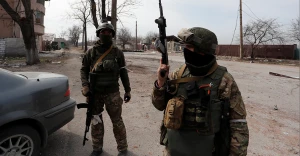
Ukraine's offensive develops in four directions in Kursk region - military expert Zgurets
Defense Express CEO Serhiy Zgurets says the operation in the Kursk region is based on the concept of a so-called mobile task force
He said this on Espreso TV.
"It's been a week since the Ukrainian Armed Forces have been conducting an offensive operation that has been extremely effective. This operation is based on the concept of a so-called mobile task force. During the Second World War, such groups were one of the effective offensive tactics of the Soviet army against Germany. The Russian army has forgotten about this theory, but as we can see, Syrskyi knows the history of the Second World War well and has adapted this solution to modern technological achievements," Zgurets said.
According to the military expert, during the week of fighting, the Ukrainian army secured control over 1,000 square kilometers of Russian territory.
"Offensive actions are developing in four directions: two of them are directed deep into the enemy's territory - Lgov and Kursk. The other two directions provide a flanking expansion of the bridgehead to the west - Rylsk, where fighting continues near Korenevo, and the right flank, which covers everything east of Sudzha. In other words, there is an advance in the direction of Kursk-Rylsk and an expansion of the flank east of Sudzha, as well as the use of the second echelon of the Ukrainian Armed Forces, which is entrenched in the most effective areas for defense. The enemy is trying to bring up reserves, but these reserves are being destroyed on the outskirts," explained Zgurets.
Ukraine’s cross-border incursion in Russia’s Kursk region
On August 6, the authorities of Russia's Kursk region stated that the Ukrainian Armed Forces allegedly tried to break through the Russian border, but were allegedly pushed back. Later, the Russian Defense Ministry reported that "the Ukrainian sabotage and reconnaissance group retreated to its territory.”
Ukraine's Main Intelligence Directorate refused to comment on the statements regarding the Kursk region. However, NV media, citing its own source in Ukrainian intelligence, wrote that the events in the Kursk region "definitely did not involve fighters of the Russian Volunteer Corps, who are fighting as part of Ukraine's Armed Forces.”
The Institute for the Study of War noted that the Russian Defense Ministry, acting governor of the Kursk region Alexei Smirnov, and some propagandists have different versions of the events in the Kursk region.
On August 7, Kremlin leader Vladimir Putin convened the Russian military leadership to discuss the situation in the Kursk region, which he called a "large-scale provocation." At the time, Russian Foreign Ministry spokeswoman Maria Zakharova called on the international community to "strongly condemn the Kyiv regime's criminal attacks on Russian territory."
On the same day, Russian media reported that workers at the Kursk nuclear power plant feared that the plant's management had not prepared for a possible attack by the Ukrainian armed forces.
Additionally, in the Kursk region, the Russians have started forming UAV operator units from civilians, providing them with up to 10 hours of training.
On August 7, a state of emergency was introduced in the Kursk region.
On August 8, the Institute for War Studies reported that Ukrainian troops confirmed advancing up to 10 km deep into the Kursk region as mechanized offensives continued.
On August 8, Russia’s National Guard announced that it had implemented additional security measures at the Kursk Nuclear Power Plant to protect a "particularly important facility."
The Washington Post reported that Ukraine has taken control of the gas metering station in Sudzha, Kursk region. Previously, Russia claimed that the Ukrainian Armed Forces had occupied several border villages and part of the town of Sudzha.
Deputy Pentagon Press Secretary Sabrina Singh stated that Ukraine’s actions in the Kursk region in Russia "are consistent with U.S. policy" and do not cause any escalation.
On Friday, August 9, it was reported that terrorists from PMC Wagner intend to fight for Russia in the Kursk region.
On August 10, President of Ukraine Volodymyr Zelenskyy called the operation in the Kursk region "pushing the war into the aggressor's territory."
On the night of Saturday, August 10, the authorities introduced a counterterrorism operation in the Bryansk, Kursk, and Belgorod regions of Russia.
On August 11, the Atesh guerrilla movement reported that the Russian 810th Brigade had been redeployed from the Pokrovsk direction (Donetsk region) to the Kursk region. Prior to that, the Russian brigade had been operating in the Kherson region.
On August 12, China's Ministry of Foreign Affairs stated they are closely monitoring the situation in Russia's Kursk region. They urge all parties to de-escalate the conflict.
- News














































